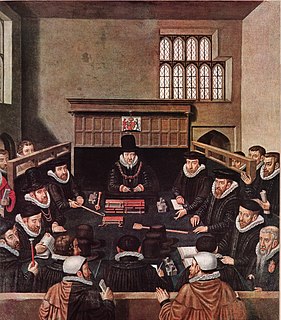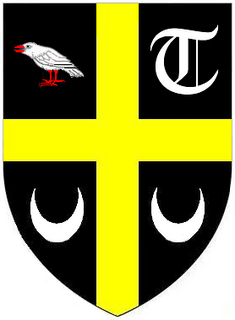Masters of Requests (Scotland)
In Scotland the office first appeared in the reign of King James V. Its functions in Scotland differed from those of the offices in England and France and included the receiving of petitions from subjects and presenting them for consideration by the Scottish Privy Council. After 1603, the Scottish Master of Requests acted as an intermediary between the Council in Scotland and the King in England. Although not named as an Officer of State in 1579, he was "to have acces in the counsalehouse and be present in tyme of counsale". In 1592, however, he was included with the Secretary, the Lord Justice Clerk, the Lord Advocate and the Lord Clerk Register who "being ordinar officaris of the estait as also senatouris of the college of justice" could not attend council on a daily basis.
The Master of Requests sat in the Scottish Parliament as an officer of State from 1604 to 1633, but his office was not revived at the Restoration, its duties being taken over by the Secretary.
Masters of Requests Ordinary - partial list

Sir Julius Caesar was an English lawyer, judge and politician who sat in the House of Commons at various times between 1589 and 1622. He was also known as Julius Adelmare.
The Comptroller of the Household is an ancient position in the British royal household, nominally the second-ranking member of the Lord Steward's department after the Treasurer of the Household. The Comptroller was an ex officio member of the Board of Green Cloth, until that body was abolished in the reform of the local government licensing in 2004. In recent times, a senior government whip has invariably occupied the office. On state occasions the Comptroller carries a white staff of office, as often seen in portraits.

The Court of Wards and Liveries was a court established during the reign of Henry VIII in England. Its purpose was to administer a system of feudal dues; but as well as the revenue collection, the court was also responsible for wardship and livery issues.
This is a list of people who have served as Custos Rotulorum of Devon.
Major General William Alington, 3rd Baron Alington LL was an Irish peer.
Groom of the Chamber was a position in the Household of the monarch in early modern England. Other Ancien Régime royal establishments in Europe had comparable officers, often with similar titles. In France, the Duchy of Burgundy, and in England while French was still the language of the court, the title was varlet or valet de chambre. In German, Danish and Russian the term was "Kammerjunker" and in Swedish the similar "Kammarjunkare".

Jonathan I Rashleigh, of Menabilly, near Fowey in Cornwall, was an English shipping-merchant, Member of Parliament for Fowey in 1614, 1621, 1625, April 1640 and November 1640, and 1661 and served as Sheriff of Cornwall in 1627. He supported the Royalist cause during the Civil War.

In the Kingdom of England, the title of Secretary of State came into being near the end of the reign of Queen Elizabeth I (1558–1603), the usual title before that having been King's Clerk, King's Secretary, or Principal Secretary.
The Mayor of Gloucester is the first citizen of the City of Gloucester, England, and acts as Chair of the Council. The Mayor represents the Council and the City at civic, ceremonial and community events both inside the City boundaries and elsewhere.
This page is based on this
Wikipedia article Text is available under the
CC BY-SA 4.0 license; additional terms may apply.
Images, videos and audio are available under their respective licenses.



